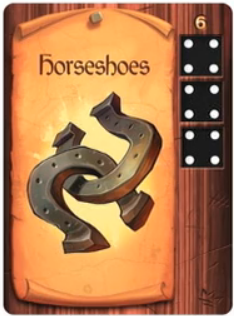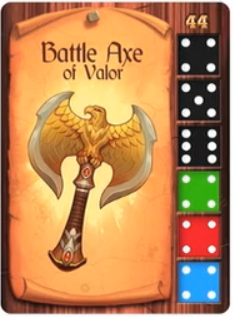For quite some time, the prevailing thought with dice games was that the only mechanic that worked was the press your luck variety. That notion is changing. In the last few years we’ve seen, slowly, a rise in a new breed of dice games. Called “dice allocation” or “dice worker” games (we prefer the former), designers are exploring territory beyond merely rolling dice for points. This is one such story. Meet King’s Forge, a delightfully simple yet strategic dice allocation game.
A royal decree has gone out that the king requires a new blacksmith. You believe you have what it takes to be the Royal Smithy and have taken up the call. Besides, being the King’s Forge is a lot less dangerous than being the King’s Hand.
King’s Forge is played out in mostly two stages: Gathering and Crafting. Each player starts the game with a handful of black dice, representing Metal. You know, because you’re blacksmiths and all. What lies before you are a series of items to create and action cards to use. Only a portion of each are used each game, and they’re determined randomly. The end result is that King’s Forge has varied play tactics each session and possesses a good degree of replayability without raising complexity.
The Gathering phase behaves like most traditional worker placement games. Each player gets to choose which of the available actions they wish to take, placing the required amount and types of dice onto that Gather card, and claiming that action for the round. These cards do a whole host of things, from getting you new and better kinds of dice, to gaining bonuses for dice rolls later in the round. The cards even give you an A or B option of action to take, which adds to your variety of choices. Most actions will return the dice to you at the end of the turn, but some require you to sacrifice the dice instead, returning them to the pool.
Alternatively, a player can choose and discard an available Gather card, opting to forgo its effects to instead take an available action at the Black Market. Unlike Gather cards, the Black Market is never randomized, and using it always makes you sacrifice dice. It does, however, allow you access to dice and abilities you otherwise may have been locked out of from other players. And hey, you don’t need to know how that guy ended up with a Magic die, only that you’re willing to pay his costly fee for it.
A new Gather card is drawn to replace any used until the deck runs out, or until all players opt to pass. After that, things move to the Crafting phase.
 In the Crafting phase, players each have a shot at trying to craft one or more of the three available items before them. They do this by rolling their unspent dice in their supply, and they need to have the right type of dice that meet or exceed the required cost to make it. If you can’t do that, well, you’re just not cut out to be the King’s Forge, are you? Take the Horseshoes for example:
In the Crafting phase, players each have a shot at trying to craft one or more of the three available items before them. They do this by rolling their unspent dice in their supply, and they need to have the right type of dice that meet or exceed the required cost to make it. If you can’t do that, well, you’re just not cut out to be the King’s Forge, are you? Take the Horseshoes for example:
They require three Metal dice of results 4 or better in order to lay a claim to it. Be wary, however, because if another player can best your dice roll in that same round, they can steal it. If you roll a 4-4-4, and they have 6-5-5, then glory of the better Horseshoes goes to them. When someone claims an item, a new, more difficult item takes its place.
At the end of any given round, if someone has at least four crafted items, they get the job.
One of King’s Forge’s biggest selling points is that for all of the variety of strategy, it’s easy to learn and plays quickly. Games usually last less than an hour – shorter than most job interviews in the real world.
Yes, it’s a dice game, so there’s a good amount of luck involved with the crafting aspect, but what’s great is that there are multiple ways to mitigate the luck component. You can try for more dice of the same kind to up your chances of decent crafting rolls for instance, or you can get special card abilities that can alter your dice results. Not being entirely at the whim of your dice roll is always a nice bonus.
King’s Forge in many ways is like the gifted child of two great dice games, Alien Frontiers and Quarriors. It captures the excitement of spilling a handful of dice on the table and seeing the results with the of satisfaction of making calculated decisions with your turns. It’s evident where King’s Forge drew some of its inspiration from, yet it has crafted something here uniquely its own. It’s quick, it’s engaging, and it’s addicting in only the way a really good dice game can be. If you’re interested in picking up the hammer and apron to become the next King’s Forge, we suggest you check out their Kickstarter page.

